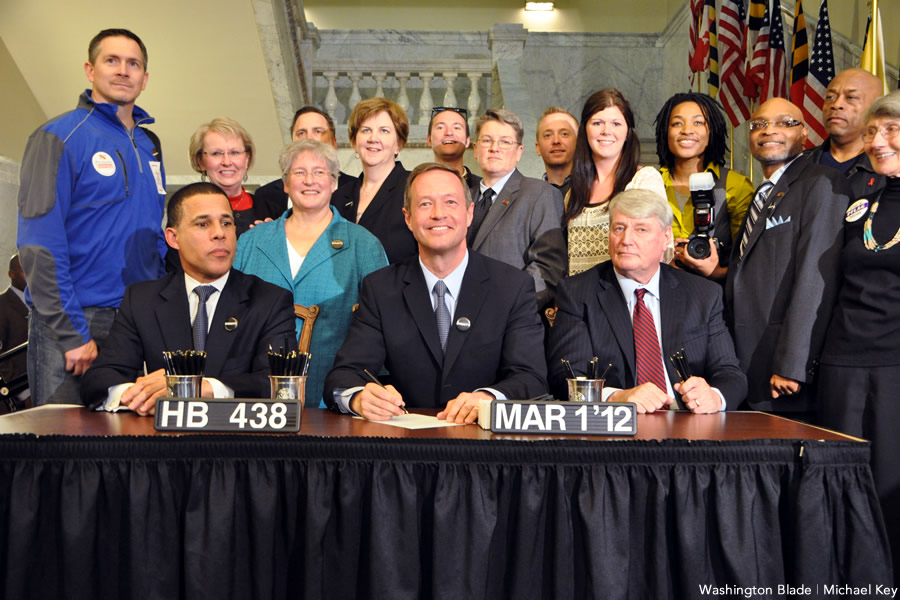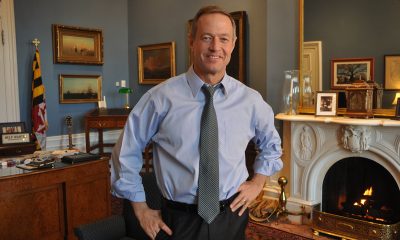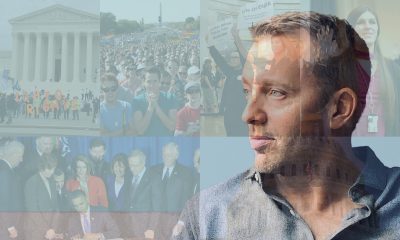Arts & Entertainment
Anatomy of a victory
Behind the scenes of the Maryland marriage battle
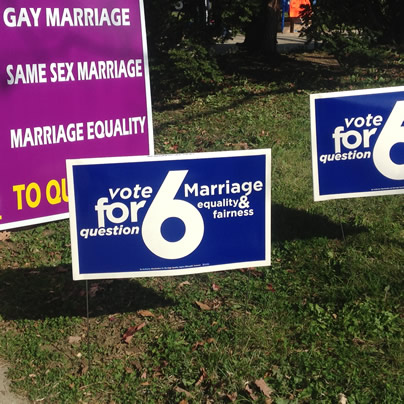
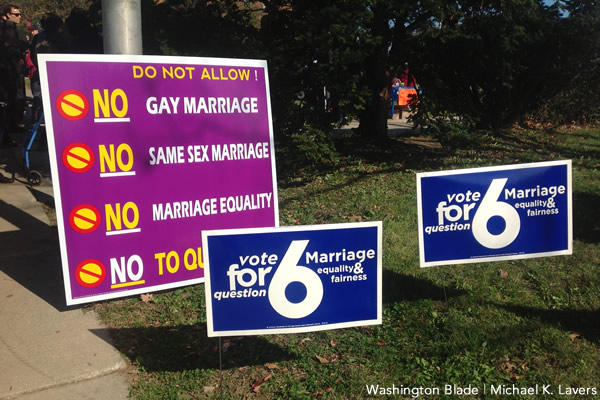
Question 6 supporters and opponents placed signs outside Northwood Elementary School in Baltimore on Nov. 6. (Washington Blade photo by Michael K. Lavers)
Edgewater, Md., residents Adri Eathorne and Kim-May Hinken arrived at Anne Arundel Medical Center in Annapolis to visit their friend, Scott Bowling, shortly before the polls closed at 8 p.m. on Election Day. The three of them nervously awaited the results of the referendum on Maryland’s same-sex marriage law as the slowly began to trickle in.
More than four hours later, they learned Question 6 had narrowly passed.
“We closed his hospital room door,” Eathorne, who has been with Hinken nine years, says. “We closed his hospital room door so we could [yell] ‘Yeah!’ and high-five each other and hug and kiss and cry.”
The passage of Question 6 by a 52-48 percent margin on Nov. 6 capped off an anxious night of waiting for the hundreds of people and dozens of reporters who had gathered at the Baltimore Soundstage.
One of Gov. Martin O’Malley’s staffers wrote on a napkin during lunch on Election Day that the referendum would pass with 53 percent support. Congressman Elijah Cummings made the same prediction during an interview with the Washington Blade earlier in the day outside a Northeast Baltimore polling place at which the governor, Baltimore Mayor Stephanie Rawlings-Blake and Brendon Ayanbadejo of the Baltimore Ravens greeted voters.
“I had a pretty good sense as we were heading into Election Day that it was going to hold,” O’Malley said in a Blade interview this week. “I had a pretty good sense in the course of those last 10 days that it was on a good positive trajectory.”
Josh Levin, campaign manager for Marylanders for Marriage Equality, was backstage with the governor, Rawlings-Blake and several other elected officials watching the results come in. President Obama had already won re-election by the time Politico reported shortly before midnight that Question 6 had passed with 84 percent of precincts reporting.
Levin and others remained hesitant to declare victory because Montgomery County had yet to report election results. (Question 6 passed in the county by a 65-35 percent margin.)
“Once we figured that out then I started breathing a little more deeply,” O’Malley says. “Then when the Montgomery County numbers came in and we were up to 51 [percent,] the night seemed to be coming into perspective. We were very reluctant to claim a victory of course until we had enough of the numbers in.”
Levin last week, while cleaning out Marylanders for Marriage Equality’s Baltimore office, says Question 6 was leading throughout the night.
“We watched it grow to 45,000 votes or so,” he says. “It shrank at one point to about 12,000. But right around midnight we felt like we had a pretty good sense of where things were. And so I went back to talk through what still could happen, what’s still out, where do we think that’s coming from and made the decision to go up on stage and declare victory from there.”
“There was confidence once the results started to come in,” says gay state Sen. Rich Madaleno (D-Montgomery County.) “There was confidence all night long, it’s just a matter of when do you say it. And because we had never won before, there’s no desire to jinx yourself. I think you’re more cautious than you would have ever been.”
The Washington Post projected Question 6 had passed just as O’Malley, Rawlings-Blake, Levin and others took to the stage to declare victory. Those gathered inside the Baltimore Soundstage became euphoric when lesbian state Del. Maggie McIntosh (D-Baltimore City) announced the referendum had passed. People began to cry. Gay state Dels. Luke Clippinger (D-Baltimore City) and Heather Mizeur (D-Montgomery County) were among those who started dancing once the governor and other dignitaries stepped away from the podium.
O’Malley instrumental in fundraising
Election Day capped off a long and often tumultuous effort for Maryland’s same-sex marriage advocates that began in 1997 when three state lawmakers introduced the first bill that would have allowed nuptials for gays and lesbians.
Equality Maryland, which nearly closed in June 2011, and the American Civil Liberties Union in 2004 filed a lawsuit on behalf of Lisa Polyak and Gita Deane and eight other same-sex couples and a gay widow who sought the right to marry in the state. The Maryland Court of Appeals in 2007 ultimately upheld the constitutionality of the state’s ban on marriage for gays and lesbians.
State lawmakers in 2011 narrowly defeated a same-sex marriage bill, but legislators approved it in February. O’Malley signed the law on March 1.
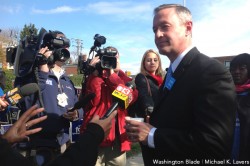
Governor Martin O’Malley speaks to reporters outside Northwood Elementary School in Baltimore on Nov. 6. (Washington Blade photo by Michael K. Lavers)
The governor soon emerged as the law’s most prominent supporter, especially after the Maryland Marriage Alliance collected more than 160,000 signatures to force a referendum on the issue. Marylanders for Marriage Equality turned to O’Malley, among others, in early August to help bolster their then-anemic fundraising efforts.
“We found ourselves in a situation where polling looked good, we felt good about what we were building, but we simply weren’t bringing in money at the rate that we needed to,” Levin says. “We as a campaign and with our board members we sort of rang the bell a little bit and talked to the governor, got Maggie McIntosh more involved. The ACLU redoubled their efforts. And I think brought to bear all the efforts that helped us [reach] the financial goals that we needed to.”
Levin said in June his group could effectively defend the law with between $5-$7 million, in spite of some observers who said Marylanders for Marriage Equality needed to raise up to $12 million.
O’Malley headlined a star-studded fundraiser gay former Republican National Committee Chair Ken Mehlman co-hosted at a New York City hotel in September that raised more than $100,000 for the pro-Question 6 group. The governor also appeared at an Oct. 2 fundraiser with D.C. Mayor Vincent Gray and House Minority Whip Steny Hoyer (D-Md.) at gay Democratic lobbyist Steve Elmendorf’s Logan Circle home. Former National Football League Commissioner Paul Tagliabue and his wife Chan announced a $100,000 donation to Marylanders for Marriage Equality during the fundraiser that Chip DiPaula, Jr., former Gov. Bob Ehrlich, Jr.’s gay chief-of-staff, attended alongside Mizeur and others.
The Human Rights Campaign contributed more than $1.5 million in cash and in-kind contributions to the pro-Question 6 campaign. Freedom to Marry, which initially declined to join the coalition defending the state’s same-sex marriage law, said it invested more than $200,000 into the campaign. This figure includes the $70,000 it gave that helped Marylanders for Maryland Equality air their radio ad highlighting President Obama’s support of marriage rights for same-sex couples in the days leading up to Election Day.
“HRC provided so much of the backbone to this whole effort,” Madaleno says. “They were absolutely critical.”
Marylanders for Marriage Equality ultimately raised $6 million — they consistently outraised the Maryland Marriage Alliance throughout the Question 6 campaign. The ACLU and other organized labor groups contributed more than $1 million to Marylanders for Marriage Equality.
New York City Mayor Michael Bloomberg and Republican hedge fund manager Paul Singer both donated $250,000 to the pro-Question 6 campaign. The bulk of the 11,000 people who contributed to Marylanders for Marriage Equality, however, live in Maryland.
“We proved from going to the state that nobody thought could win to being the second-widest margin after Maine among the four is pretty cool,” Levin says. “And I want to really say the team that was here through the legislative campaign that figured out, that believed in doing Maryland when nobody else did — the leadership of folks like Sultan [Shakir] and Kevin [Nix], Rich Madaleno and Luke Clippinger and all the others.”
One of the proudest moments of the campaign for Levin came when Marylanders for Marriage Equality was able to counter a Maryland Marriage Alliance television ad that claimed Question 6 would force schools to teach same-sex marriage with their own ad eight hours later that featured Baltimore County teacher Pamela Gaddy. Levin showed it to McIntosh, HRC President Chad Griffin, former O’Malley adviser Joe Bryce and his wife Kristen and a handful of others shortly after he arrived at a campaign fundraiser at DiPaula’s home before he put it on the air on Oct. 26.
“We were ready and able to do it that fast, versus the stories that so many other folks who worked in California [on the campaign against Proposition 8] told just having to figure it out there,” Levin says. “The lessons they learned they gave us and we applied. And we took a Maryland angle on it, putting up an African-American, Baltimore-area schoolteacher to just go, ‘That’s not true, you know.’ When we looked at it a week later, their argument wasn’t resonating. People just weren’t buying it, according to our research.”
Obama, NAACP endorsements key
O’Malley, Levin and Mizeur all noted Obama’s public support of marriage rights for gays and lesbians and his endorsement of the same-sex marriage law garnered additional support among black Marylanders.
In addition to the radio ad featuring the president, Marylanders for Marriage Equality also sent a mailing that contained his and first lady Michelle Obama’s statements in support of marriage rights for same-sex couples to 200,000 African-American households in the state. (Baltimore Black Pride co-chair Meredith Moise was handing out these fliers on Election Day as she spoke with voters outside a polling place at a Northeast Baltimore elementary school.)
“It was important that we echoed their support,” Levin says.
The NAACP’s support of Question 6 and particularly television ads that featured Julian Bond, the civil rights organization’s chair emeritus, and Revs. Delman Coates of Mount Ennon Baptist Church in Clinton and Donté Hickman of Southern Baptist Church in Baltimore appear to have resonated with voters in the predominantly black Charm City.
Question 6 passed by a 57-43 percent margin in Baltimore City. It lost by slightly more than 4,300 votes in Prince George’s County.
A Public Policy Polling survey in May found 55 percent of black Marylanders would vote for the law, compared to 36 percent who said they would oppose it. A Hart Research Associates survey conducted in late July found 44 percent of African-American voters would support Question 6, compared to 45 percent who said they would vote against it. A Gonzales Research poll in September noted 44 percent of black Marylanders backed marriage rights for same-sex couples, compared to 52 percent who oppose nuptials for gays and lesbians. An Associated Press exit poll indicates roughly half of black Maryland voters voted against Question 6.
Maryland Marriage Alliance Chair Derek McCoy, Bishop Harry Jackson, Jr., of Hope Christian Church in Beltsville and others who opposed the law repeatedly criticized and even mocked the NAACP, Obama, Coates, Hickman and other prominent black leaders who backed marriage rights for same-sex couples in the state. Some Question 6 opponents resorted to increasingly homophobic rhetoric during appearances at black churches and other public forums in the weeks leading up to Election Day. Pastor Luke Robinson of Quinn Chapel AME Church in Frederick even suggested during a sparsely attended rally against the same-sex marriage law at a city park on Nov. 4 that Superstorm Sandy struck New York City less than three weeks after Bloomberg donated $250,000 to Marylanders for Marriage Equality.
“It pretty clearly was having an effect,” Levin says. “I don’t think the other guys would have been bringing it up as often if it hadn’t been.”
The Maryland State Conference of the NAACP and the organization’s Prince George’s County and Baltimore branches in particular factored prominently in the pro-Question 6 campaign.
Bob Ross, president of the Prince George’s County Branch of the NAACP, organized phone banks and canvassing efforts ahead of Election Day. He also spoke about his gay brother who had lived in the closet for years during a Nov. 5 rally at the University of Maryland in College Park that O’Malley, Hoyer, Madaleno, state Sen. Allan Kittleman (R-Carroll and Howard Counties) and others attended.
“Surely we need to recognize not only the importance of their endorsement, but the amount of work that they did,” Levin says.
Couples busy planning weddings
With all the behind-the-scenes work that led to the passage of Question 6, the only thing that matters to those who plan to take advantage of the law once it officially takes effect on Jan. 1 is the fact they can legally marry the person they love.
“It was kind of like, ‘Oh my God, what are we doing about our wedding plans?’” says ShaDonna Jackson, a Hyattsville, Md., resident who plans to wed her partner of nearly four years, Latisha Smith. “We needed absolute certainty because it’s a serious matter. It’s like, ‘Oh my goodness everything depends on this, so we need to know.’ And now that we know, we are back to our wedding plans.”
Eathorne and Hinken, who chairs the annual Chesapeake Pride Festival, are planning to get married in Annapolis on the first day same-sex couples can legally marry in the state.
“We’ve waited so long for it to be legal in our home state that we really wanted to do it as soon as possible,” Eathorne says (they had a church wedding in 2007). Hinken also spoke in support of the same-sex marriage bill in front of the State House in Annapolis. “We just want to make that statement. And that’s one of the reasons why we want it to be ASAP. We’ve been together for nine years. We don’t need a big full-blown wedding. We had our thing. It is special and we do plan to acknowledge it and celebrate it in some way.”
Madaleno, who once again proposed to his husband Mark on stage at the Baltimore Soundstage after Question 6 passed, plans to have what he describes as their “renewal of vows” once they and their two children return from a family vacation at Walt Disney World in Florida in January. The couple married 11 years ago at their Bethesda church, but Madaleno said having the legal recognition will make it even more official.
“What will be different,” he says, “is we’re getting a license.”

Friday, April 18
“Center Aging Friday Tea Time” will be at 2 p.m. on Zoom. This is a social hour for older LGBTQ+ adults. Guests are encouraged to bring a beverage of choice. For more details, email [email protected].
Go Gay DC will host “LGBTQ+ Community Social in the City” at 7 p.m. at Hotel Zena. This event is ideal for making new friends, professional networking, idea-sharing, and community building. This event is free and more details are available on Eventbrite.
Trans and Genderqueer Game Night will be at 6 p.m. at the DC Center for the LGBT Community. This will be a relaxing, laid-back evening of games and fun. All are welcome and there’ll be card and board games on hand. Feel free to bring your own games to share. For more details, visit the DC Center’s website.
Saturday, April 19
Go Gay DC will host “LGBTQ+ Community Brunch” at 11 a.m. at Freddie’s Beach Bar & Restaurant. This fun weekly event brings the DMV area LGBTQ+ community, including Allies, together for delicious food and conversation. Attendance is free and more details are available on Eventbrite.
LGBTQ People of Color Support Group will be at 7 p.m. on Zoom. This peer support group is an outlet for LGBTQ People of Color to come together and talk about anything affecting them in a space that strives to be safe and judgement free. There are all sorts of activities like watching movies, poetry events, storytelling, and just hanging out with others. For more information and events for LGBTQ People of Color, visit thedccenter.org/poc or facebook.com/centerpoc.
“Spark Sapphic Social” will be at 8 p.m. at Spark Social House. This weekly sapphic social is an opportunity to mix and mingle with other sapphics in D.C.’s newest LGBTQ bar. This event is free and more details are available on Eventbrite.
“DC Drag Brunch on Rooftop – Penthouse (Formerly at Lima Twist)” will be at 12 p.m. at Baby Shank Rooftop. Hosted by Miss Capital Pride, this is the ultimate drag brunch experience in Washington, D.C., featuring the fiercest queens around. Prepare to be entertained by glamorous drag queens and celebrated celebrity impersonators, including Taylor Swift, Lady Gaga, Beyoncé, Britney Spears, Nicki Minaj, Ariana Grande, Whitney Houston, Cher and many more. Tickets cost $27 and are available on Eventbrite.
Sunday, April 20
Queer Crayon Club will host “Queer Sketch Social” at 3 p.m. at Sinners and Saints. This is a fun event for LGBTQ+ adults to come together and color. Attendance is free and more details are available on Eventbrite.
Monday, April 21
“Center Aging Monday Coffee & Conversation” will be at 10 a.m. on Zoom. This is a social hour for older LGBTQ+ adults. Guests are encouraged to bring a beverage of choice. For more details, email [email protected].
Tuesday, April 22
Genderqueer DC will be at 7 p.m. on Zoom. This support group is for people who identify outside of the gender binary. Whether you’re bigender, agender, genderfluid, or just know that you’re not 100% cis – this is your group. For more details, visit www.genderqueerdc.org or Facebook.
Coming Out Discussion Group will be at 7 p.m. on Zoom. This is a peer-facilitated discussion group and a safe space to share experiences about coming out and discuss topics as it relates to doing so. For more details, visit the group’s Facebook.
Wednesday, April 23
Job Club will be at 6 p.m. on Zoom. This is a weekly job support program to help job entrants and seekers, including the long-term unemployed, improve self-confidence, motivation, resilience and productivity for effective job searches and networking — allowing participants to move away from being merely “applicants” toward being “candidates.” For more information, email [email protected] or visit thedccenter.org/careers.
Asexual and Aromantic Discussion Group will be at 7 p.m. on Zoom. This is a space where people who are questioning this aspect of their identity or those who identify as asexual and/or aromantic can come together, share stories and experiences, and discuss various topics. For more details, email [email protected].
Thursday, April 24
Virtual Yoga with Sarah M. will be at 7 p.m. on Zoom. This is a free weekly class focusing on yoga, breath work, and meditation. For more details, visit the DC Center for the LGBT Community’s website.
DC Anti-Violence Project Open Meeting will be at 7 p.m. on Zoom. This meeting is open to anyone interested in learning more and getting involved in lessening violence both within and directed towards the LGBT communities. For more information, visit Facebook or Twitter.
Movies
Heartfelt ‘Wedding Banquet’ remake a romcom worth seeing
Mishaps, crossed wires, conflicts are all part of the fun
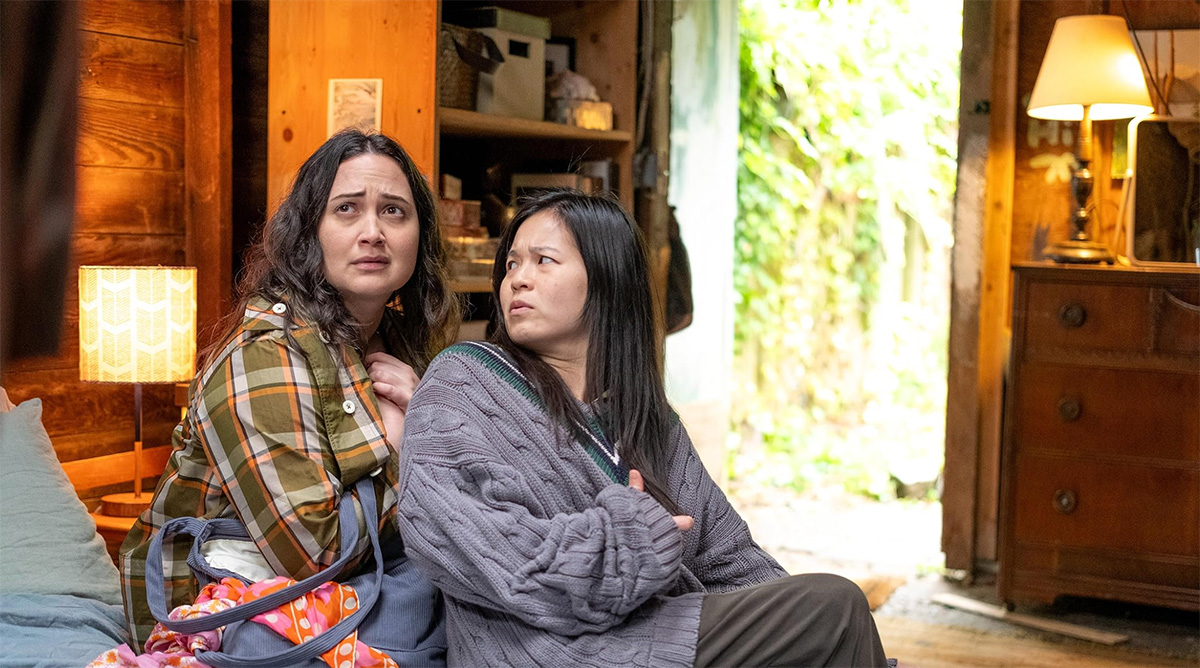
Creating a worthy remake can be a tricky proposition, especially when the movie being remade is a beloved classic – but that doesn’t mean it’s an impossible one.
Consider Andrew Ahn’s new version of 1993’s “The Wedding Banquet,” a film that put future “Brokeback Mountain” director Ang Lee on the proverbial map in America, which opens in theaters this weekend after a debut at Sundance earlier this year. The original, an American/Taiwanese production which became a surprise hit in the U.S., broke ground with its story — a culture-clash comedy of manners about a queer romantic triangle attempting to stage a sham wedding, it was quickly embraced by LGBTQ audiences thrilled to see representation on the big screen and positive representation, at that, in an era when it was even scarcer than it is today. To undertake a remake of such a film is a bold move, to say the least.
Yet gay Korean American writer/director Ahn (“Spa Night,” “Fire Island”) – has built his blossoming career on films about queer relationships among Asian American characters, with as much (or more) emphasis on family, both biological and chosen, as on romantic partnership; It seems natural, perhaps, for him to reinterpret this influential classic through his own lens, and he’s already proven himself as a filmmaker whose strengths line up perfectly with the material.
Even so, Ahn hedges his bets, perhaps, by collaborating on the new screenplay with James Schamus, who also co-wrote the original (along with Lee and Neil Peng), and the result is a movie that – although it recrafts the original romcom for a newer age and reconfigures its central relationships a bit to “up the ante” on its complications – stays relatively faithful to the broad strokes of its plot.
In this iteration, the New York setting is transposed to Seattle, and the plot revolves around not just one queer romance, but two: Chris and Min (Bowen Yang and Han Gi-Chan), a stalled grad student and his South Korean boyfriend, and their lesbian friends-and-landladies Lee and Angela (Lily Gladstone and Kelly Marie Tran), who are struggling to become parents through expensive IVF treatments. Min, an artist whose temporary visa is about to expire, wants to stay with Chris and build a life in America, but his grandmother (Youn Yuh-jung) – currently running the vast family business empire to which he is heir – wants him to come home and claim his place in the organization. A wedding to Chris would secure him the green card he needs to defy his grandmother’s demands, but it would also mean outing himself as gay and potentially being cut off from his inheritance. As a solution, he offers to pay for Lee and Angela’s fertilization procedure in exchange for a “green card wedding” with the latter, ensuring that he can remain in the U.S. while also remaining in the closet to his family.
Of course it’s an idea as bad as it sounds, but despite some reticence, the couples agree to the plan; but when grandmother decides to come to America and meet the bride in person, the four of them must attempt to pull off a masquerade that escalates far beyond their expectations after she insists on putting on a traditional – and elaborate – Korean wedding worthy of her grandson’s exalted status, all while wrestling with the ambivalence and doubts that begin to encroach on their relationships as the scheme begins to fray at the edges.
Those who’ve seen the original already know that things don’t play out exactly as planned – and anyone who hasn’t won’t be surprised when it doesn’t, anyway. We already told you it was a bad idea.
That, of course, is the charm of the romcom, a genre in which mishaps, crossed wires and conflicts are all part of the fun, and in any case it gives Ahn’s film the opportunity to explore – as Lee did with the original – the more serious and relatable challenges of reconciling our queerness with the deeply ingrained traditions of our cultural background; he does so with gentle wit and an equal measure of respect, but he’s not above getting laughs by pointing up the sheer absurdity that sometimes goes along with the process. Neither does he hesitate to delve into the messiness of queer relationships, even (and perhaps especially) with lifelong friends, or the deep insecurities and self-criticisms which get in the way of sorting them out.
To these ends, “Wedding Banquet” relies heavily on its cast, who embrace and clearly relish the chance to flesh out these characters. Yang brings his inevitable “SNL” star power to the table but downplays the wackiness in favor of a more nuanced tone, and Gi-Chan shines as his pragmatically idealistic partner; Gladstone’s intelligence and authenticity is a grounding force, while Tran counterpoints her with an eminently likable turn as her spunky-but-anxious misfit of a girlfriend – and the resonance they each bring to the prospect of motherhood highlights the longing for family and legacy that so many queer couples carry as they build their lives together.
It’s not all about the couples, though. Veteran Chinese American actress Joan Chen (“Tai Pan,” “Twin Peaks”) is a scene stealer as Angela’s hyper-supportive mom, whose participation in her daughter’s “lavender wedding” requires her to go against her deepest instincts as a proud ally, and Bobo Le provides a further connection to the theme of family with a charming performance as Yang’s tomboy-ish little sister. The anchoring performance, however, comes from acclaimed Korean star Yuh-jong, whose shrewd, savvy, and staunch portrayal of Gi-Chan’s power player grandma adds a much-needed dose of level-headed wisdom into the midst of the whirlwind.
In the end, Ahn’s update of Lee’s classic comedy scores big points for honoring the original’s message of acceptance and embracing the notion of reimagining our ideas of traditional family structures to meet the needs of an ever-changing world; it also succeeds in maintaining a heartfelt sense of empathy for each of its characters, all of whom appeal to us precisely because of their imperfections and their hangups. None of them are perfect, but all of them are perfectly human, which goes a long way toward making Ahn’s remake feel like more than just the slickly-made feel-good romcom it resembles.
And yet, given the screwball potential and the endless possibilities for farcical developments in the convoluted deception attempted by its sets of lovers, Ahn’s “Wedding Banquet” could have been funnier. Leaning into an idealized and sentimental perspective as it gracefully brings its characters’ lives into place, it occasionally feels a bit “precious,” too “Hollywood” to be believed.
Again, however, this is part of the charm of the romcom: if generations of straight audiences have gotten the chance to buy into idealized big screen fantasies about life and love, then why shouldn’t we enjoy the same privilege?
With that in mind, “The Wedding Banquet” makes for a perfect opportunity to entertain and validate ourselves – and even if it doesn’t tickle your funny bone, it’s a generous enough feast for your queer soul that it deserves you to see it.
Just make sure you bring somebody special to share your popcorn with.
a&e features
Peppermint thrives in the spotlight
In exclusive interview, she talks Netflix show — and the need to resist Trump’s attacks

As an entertainer, there’s not much that Peppermint hasn’t done. She’s a singer, actor, songwriter, reality TV personality, drag queen, podcaster and the list goes on. Most importantly, as an activist she has been an invaluable role model for the trans, queer, and Black communities.
She’s a trailblazer who boasts an impressive list of ‘firsts.’ She is the first out trans contestant to be cast on “RuPaul’s Drag Race” (Season 9). She is the first trans woman to originate a principal musical role for Broadway’s “Head Over Heels.” She was also the first trans woman to compete in the runaway hit series “Traitors,” on Peacock, and she is the ACLU’s first-ever Artist Ambassador for Trans Justice. Her accolades are a true testament of the courage it took for Peppermint to live her authentic self.
We caught up with Peppermint to chat about her activism, taking on bigger roles on screen, our current political and social climate and life beyond the lens. For Peppermint, coming out as trans was not just a moment of strength—it was a necessity.
“It unfolded exactly as I had imagined it in terms of just feeling good and secure about who I am. I was in so much pain and sort of misery and anguish because I wasn’t able to live as free as I wanted to and that I knew that other people do when they just wake up. They get dressed, they walk out the door and they live their lives. Being able to live as your authentic self without fear of being persecuted by other people or by the government is essential to being healthy,” Peppermint tells the Blade in an exclusive interview.
“I was not able to imagine any other life. I remember saying to myself, ‘If I can’t imagine a life where I’m out and free and feeling secure and confident and left alone, then I don’t even want to imagine any kind of a life in the future,’” says Peppermint.
Recently, Peppermint returned for season 2 of Netflix’s comedy “Survival of the Thickest.” She added some spice and kick to the first season in her role as a drag bar owner. This time around, her character moves center stage, as her engagement and wedding become a major plot line in the show. Her expanded role and high-profile trans representation come at just the right time.
“It’s the largest acting role I’ve ever had in a television show, which my acting degree thanks me. It feels right on time, in a day where they’re rolling back trans rights and wanting to reduce DEI and make sure that we are limited from encouraging companies, corporations, industries, and institutions from not only featuring us, but supporting us, or even talking about us, or even referencing us.
“It feels great to have something that we can offer up as resistance. You can try to moralize, but it’s tougher to legislate art. So it feels like this is right on time and I’m just really grateful that they gave me a chance and that they gave my character a chance to tell a greater story.
Peppermint’s expanded role also accompanies a boom in queer representation in Black-powered media. Networks like BET and Starz and producers like Tyler Perry, are now regularly showcasing queer Black folks in main story lines. What does Peppermint think is fueling this increased inclusion?
“Queer folks are not new and queer Black folks are not new and Black folks know that. Every Black person knows at least one person who is queer. We are everywhere. We have not always been at the forefront in a lot of storytelling, that’s true, and that’s the part that’s new. It’s Hollywood taking us from the place where they usually have held us Black, queer folks in the makeup room, or as the prostitute, as an extra—not that there’s anything wrong with sex work or playing a background performer. I’ve played the best of the hookers! But those [roles] are very limiting.
“Hollywood has not historically done and still does not do a very good job of, including the voices of the stories that they make money [on]. And I think they’re realizing [the need] to be inclusive of our stories and our experiences, because for a long time it was just our stories without our actual experiences. It’s also exciting. It’s dramatic. It makes money. And they’re seeing that. So I think they’re just dipping their toes in. I think that they’re going to realize that balance means having us there in the room.”
Peppermint’s activism is tireless. She has raised more than six figures for prominent LGBTQ rights groups, she continues to speak around the nation, appears regularly on major media outlets addressing trans and LGBTQ issues and has been honored by GLAAD, World of Wonder, Out magazine, Variety, Condé Nast and more—all while appearing on screen and onstage in a long list of credits.
Now, under the Trump administration, she doesn’t have time to take a breath.
“I wouldn’t be able to do it if it weren’t second nature for me. Of course, there are ups and downs with being involved with any social issue or conversation and politics. But I am, for now, energized by it. It’s not like I’m energized by like, ‘Ooh, I just love this subject!’ right? It’s like, ‘Oh, we’re still being discriminated against, we gotta go and fight.’
“That’s just what it is. I get energy because I feel like we are quite literally fighting for our lives. I know that is hyperbole in some regards, but they are limiting access to things like housing, healthcare, job security and not having identification. Passport regulations are being put in a blender.”
Peppermint also mentions her thoughts on the unfair mandates to remove trans service members and revoke the rights and resources from the veterans who worked their whole lives to fight for this country.
“When you strip all these things away, it makes it really difficult for people to have a life and I know that that is what they’re doing. When I look around and see that that is what is at stake, I certainly feel like I’m fighting for my life. And that’s energizing.
“The only thing that would be the most rewarding besides waking up in a utopia and suddenly we’re all equal and we’re not discriminating against each other—which probably is not happening this year—is to be able to be involved in a project like this, where we can create that world. It’s also being built by people who are a part of that story in real life and care about it in real life.”
Peppermint is clear on her point that now is the time for all of the letters of the LGBTQ community to come together. Everyone who is trans and queer should be joining the fight against the issues that affect us all.
“Just trust us and understand that our experiences are tied together. That is how and why we are discriminated against in the way[s] that we are. The people who discriminate—just like how they can’t really distinguish between somebody who’s Dominican and somebody who’s African American — you’re Black when you’re getting pulled over. We are discriminated against in much the same way. It’s the same with being trans or queer or gender non-conforming or bi, we all have our own experiences and they should be honored.
“When laws are being created to harm us, we need to band together, because none of y’all asses is gonna be able to stop them from getting rid of marriage equality—which is next. If you roll the tape back to three years ago when somebody was trying to ask me about drag queen bans on readings in school, I was saying they’re coming for trans rights, which comes for bodily autonomy and abortion rights, which comes for gay marriage rights. Those three things will be wiped out.
Peppermint doesn’t take a pause to get fired up and call gay folk out in their obligation to return the favor to the Black trans community.
She shares with us her final thoughts.
“You cis-gender homosexuals need to stand the fuck up and understand that we are standing in front of you. It’s very difficult to understand this and know this, but so many of the rights that we have were hard fought and won by protest and by people fighting very hard for them. And many of those people in every single instance from the suffrage movement, obviously Civil Rights, queer rights, the AIDS and HIV movement—Black queer people have been there the entire time. Trans people have always been a part of that story, including Stonewall. Yes, we are using different terminology. Yes, we have different lenses to view things through, but let me tell you, if you allow us to be sacrificed before you see us go off the side, you will realize that your foot is shackled to our left foot. So, you better stand the fuck up!”
Peppermint for president!
-

 District of Columbia5 days ago
District of Columbia5 days agoFinal push to raise funds, fill D.C. hotels as WorldPride nears
-

 El Salvador3 days ago
El Salvador3 days agoGay Venezuelan makeup artist remains in El Salvador mega prison
-

 District of Columbia4 days ago
District of Columbia4 days agoReenactment of 1965 gay rights protest at White House set for April 17
-

 Maryland5 days ago
Maryland5 days agoFreeState Justice: Transgender activist ‘hijacked’ Moore’s Transgender Day of Visibility event

